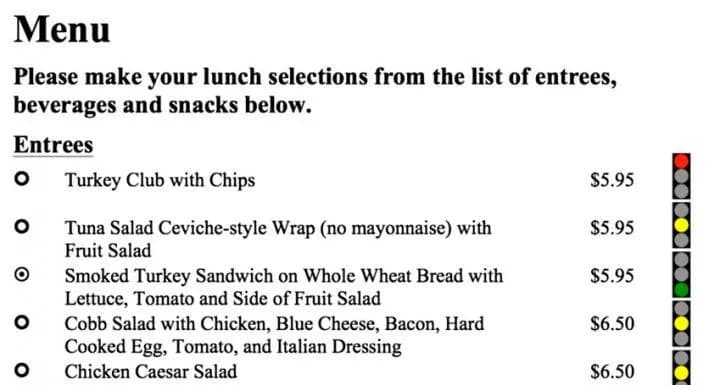
'Traffic-Light' And Numeric Calorie Labels Cut Calorie Consumption By 10 Percent
Imagine you're ordering lunch from your favorite online delivery spot, and just before submitting your order, you notice that the club sandwich in your cart is marked with a red stop light signifying high calorie content. Would you keep it in your cart? New research from the Perelman School of Medicine at the University of Pennsylvania suggests you might switch to a lower-calorie option. When researchers added color-coded or numeric calorie labels to online food ordering systems, the total calories ordered was reduced by about 10 percent when compared to menus featuring no calorie information at all. The study is the first to evaluate the effect of "traffic-light" calorie labeling -- where green labels signal low calorie content, yellow labels signal medium calorie content, and red labels signal high calorie content -- in the increasingly common setting of ordering meals online. Results are published online in the Journal of Public Policy & Marketing.
"Calorie labeling appears to be effective in an online environment where consumers have fewer distractions, and the simpler traffic-light labeling seems as effective as standard calorie numbers," said lead author Eric M. VanEpps, PhD, a postdoctoral researcher at the Center for Health Incentives and Behavioral Economics at the Perelman School of Medicine at the University of Pennsylvania.
The U.S. Food and Drug Administration has said that in May 2017 it will begin mandating numeric calorie labeling for restaurants, movie theaters, vending machines, and food delivery services -- including delivery services with online ordering. States such as Vermont and cities including New York and Philadelphia also have begun to implement broad calorie-labeling mandates.
For the study, VanEpps and colleagues from Carnegie Mellon University set up a system in which corporate employees ordering lunch from a cafeteria via a newly-developed online portal were presented with the calorie information for menu items via numeric or traffic light calorie labels, both together, or none at all. Over the six week study period, 803 orders were placed by the 249 study participants.
The team found that each of the three calorie labeling conditions -- numbers alone, traffic lights alone, or both labels together -- reduced calories ordered by about 10 percent, compared to orders involving no calorie labels.
"The similar effects of traffic light and numeric labeling suggests to us that consumers are making decisions based more on which choices seem healthier than on absolute calorie numbers," VanEpps said.
As expected, the simple traffic light labeling of calorie content had a particularly strong impact among the subset of participants who scored poorly on a simple test of math ability (numeracy). Calorie labeling overall also had a stronger impact among obese participants than among non-obese participants. Results of the study add to ongoing research from the team examining calorie labeling's impact in different meal-ordering settings.
"Future studies looking at different menu types and sets of participants are necessary, but this study on its own provides clear evidence that both calorie labeling methods can be effective when ordering meals online," VanEpps said. "It's important that research be conducted in all ordering contexts where calorie labeling mandates might be applied."
The above post is reprinted from materials provided by University of Pennsylvania School of Medicine. Note: Materials may be edited for content and length.
Disclaimer: DoveMed is not responsible for the adapted accuracy of news releases posted to DoveMed by contributing universities and institutions.
Primary Resource:
VanEpps, E. M., Downs, J. S., & Loewenstein, G. (2016). Calorie Label Formats: Using Numeric and Traffic Light Calorie Labels to Reduce Lunch Calories. Journal of Public Policy & Marketing, 35(1), 26-36.
Related Articles
Test Your Knowledge
Asked by users
Related Centers
Related Specialties
Related Physicians
Related Procedures
Related Resources
Join DoveHubs
and connect with fellow professionals

0 Comments
Please log in to post a comment.